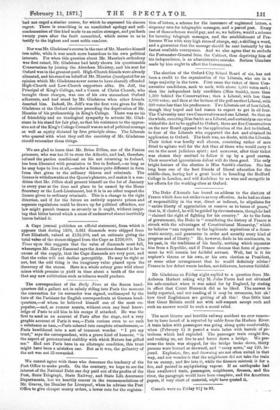The Duke d'Aumale has issued an address to the electors
of France which does not strike us as very effective. As he had no share of responsibility in the war, direct or indirect, he stipulates for " entire liberty of appreciation or reserve as to terms of peace," that is, if elected, he will be guided by circumstances, though he had " claimed the right of fighting for his country." As to the form of government, the Duke in " considering the history of France is struck with the advantages of Constitutional Monarchy," which he believes "can respond to the legitimate aspirations of a demo- cratic society, and guarantee in order and security every kind of progress and of liberty." He, however, finds in his sentiments, in his past, in the traditions of his family, nothing which separates him from a Republic, and if France chooses that form of govern- ment he will remain her faithful servant. Well, but is it his nephew's throne or his own, or his own election as President, or some other arrangement that he would definitely advise? France in her defeat wants leaders, not followers, however faithful.






























 Previous page
Previous page